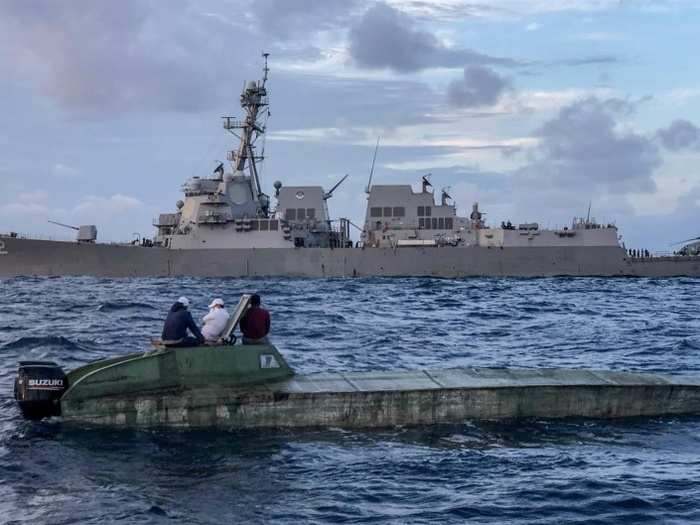

The expansion of the drug war and with it the Coast Guard's authority to detain suspected smugglers has raised concerns about legal procedure and due process.
Coast Guard crews coordinate with countries in the region to resolve jurisdictional issues regarding suspected smuggling vessels and people aboard them, but the service has faced criticism for holding detainees in international waters for weeks or months — a former Coast Guard lawyer described the cutters holding detainees as "floating Guantanamos."
In a December 2017 interview, then-Coast Guard Commandant Adm. Paul Zukunft defended the service, calling that description "an unfair stab at the Coast Guard."
"We will provide them food, provide them shelter, provide them sanitation facilities. This is really a challenge of logistics," Zukunft said. "We're spending, right now, about 30% of our at-sea patrol time doing logistics for detainees to facilitate their arrival in the United States for further prosecution, so it really is a logistics effort."




Cocaine production in Colombia, the main producer of the drug, has spiked in recent years, and the Coast Guard has hauled in record-setting amounts of cocaine over the same period.
Fiscal year 2017, which ran from October 2016 to September 2017, has the record with 493,000 pounds seized, topping the previous mark of 443,000 pounds set in fiscal year 2016. (The 2016 total well exceeded the previous record of 367,700 pounds in 2008.)
During fiscal year 2018, the service intercepted just over 458,000 pounds of cocaine — the second-highest total ever. Through July 2019, the Coast Guard had intercepted 230,000 pounds of the drug.
 Tesla tells some laid-off employees their separation agreements are canceled and new ones are on the way
Tesla tells some laid-off employees their separation agreements are canceled and new ones are on the way Taylor Swift's 'The Tortured Poets Department' is the messiest, horniest, and funniest album she's ever made
Taylor Swift's 'The Tortured Poets Department' is the messiest, horniest, and funniest album she's ever made One of the world's only 5-star airlines seems to be considering asking business-class passengers to bring their own cutlery
One of the world's only 5-star airlines seems to be considering asking business-class passengers to bring their own cutlery The Future of Gaming Technology
The Future of Gaming Technology
 Stock markets stage strong rebound after 4 days of slump; Sensex rallies 599 pts
Stock markets stage strong rebound after 4 days of slump; Sensex rallies 599 pts
 Sustainable Transportation Alternatives
Sustainable Transportation Alternatives

Copyright © 2024. Times Internet Limited. All rights reserved.For reprint rights. Times Syndication Service.